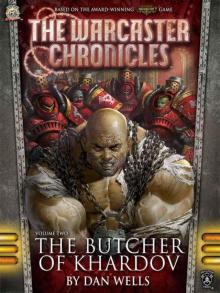Bluescreen Read online
Page 3
“Speaking of,” he said, “you see the news?”
Marisa nodded. “Scorcher won the Oceana Regional.”
“No, the real news. The Foundation is protesting the new Ganika Tech plant they’re building in Westminster.”
“I suppose we should have seen that coming. The biggest djinni company in the world and a militant anticybernetics group? It’s like a match made in heaven.”
“Not so much a ‘group’ as a ‘terrorist organization,’” said Bao. “And they’re right here in LA. This doesn’t freak you out?”
“It’s all the way down in Westminster,” said Marisa, and held up a finger. “Note that this is not me being cavalier about them blowing people up just because they’re far away. I sincerely hope that they don’t, and that, if they do, they get caught. But I reserve the right not to be shocked when terrorists commit acts of terror. That’s exactly what they want; that’s like playing their side of a lane.”
“I’m going to guess that’s an Overworld metaphor.”
“Exacto. If we let the Foundation dictate the terms of—”
“Hold up,” said Bao quickly, his voice low, and Marisa could tell instantly that something was wrong. “That looks like trouble.”
Marisa followed his gaze back over her shoulder toward the front of the restaurant, seeing three young men in long, untucked dress shirts, their hair pulled back in tight ponytails. Two of them had bionic arms, Detroit Steel by the ostentatious look of them, one on the left side and one on the right. The third man, standing between them, was almost impossibly skinny, his face covered in ornate, skull-like tattoos.
“La Sesenta,” said Marisa, identifying the gangsters immediately. La Sesenta was Mirador’s resident street gang, and seeing them here was even more trouble than Bao suspected. “Mierda.”
“You recognize any of them?”
“The skinny one’s called Calaca,” Marisa whispered. “He’s pretty high up in the gang.” The three cholos were standing in the entryway, surveying the restaurant like they were thinking about buying it. The look sent shivers down her spine.
“No gangs allowed,” said Guadalupe loudly, bustling fearlessly toward them from the side room. Marisa felt her heart skip a beat at her mother’s brazen disregard for the danger; the other customers had noticed the cholos now as well, and a nervous wave rippled through the restaurant. “No gang colors, no weapons. We don’t want any trouble here.”
“Si, señora,” said Calaca. He smiled, and half his teeth were steel. “That’s exactly why we’re here—we don’t want any trouble either.” His accent was thick, but his diction was almost humorously overeducated. “The problem is, the man you rely on to keep you out of trouble is doing a very poor job, as our presence here might indicate.”
“What’s he talking about?” whispered Bao.
“My parents pay protection money to the Maldonados,” Marisa whispered back.
“Seriously?”
“Everybody does,” said Marisa. “It’s the only reason this neighborhood isn’t a smoking crater run by these chundos.” Marisa stood up. “I gotta go talk my mom down before she gets herself shot.”
“Sit,” said her father sternly, appearing behind Marisa as he stormed out from the kitchen.
Carlo Magno was shorter than his wife, and wider—not fat, but thick and muscled. He must have been chopping meat, for his apron was streaked with blood; he looked fierce and imposing, but Marisa was grateful he’d left the knife in the kitchen. He pushed her firmly back into her chair without breaking stride, and stormed toward the gangsters with fire in his eyes. “Get out of my restaurant!”
Marisa linked to the police and sent a message pleading for help.
“As I’ve explained to your woman,” said Calaca, “we’re only here to—”
“I’ve called the Maldonados,” said Carlo Magno.
“That seems like a very poor decision on your part,” said Calaca. “They don’t like us very much, and my associates don’t like them. If the enforcers show up and start making unreasonable demands, one side might—and I say might, because it is very uncertain—open fire on the other, and with your fine establishment caught in the middle that will—and this time I say will, because if we get to this point it will be an inescapable outcome—be very bad for your business.”
“We pay them for protection,” said Marisa’s father fiercely, “and they pay you to stay away from us.”
“They ‘pay’ us,” said Calaca, looking at the thugs behind him. He turned back to Carlo Magno. “You’ll have to excuse my English, as it’s only a second language. Pay is the present tense, implying that the Maldonados currently, on an ongoing basis, pay us money to leave you alone. Is that what you’re saying? Because I suspect the past progressive tense: they used to pay us to leave you alone. The brutal truth, which your statement did not allow for, is that they are not paying us anymore, which means that you’re not being protected anymore, which is why my friends and I have come here today to magnanimously offer to pick up the slack where the Maldonados have dropped it—”
“Did my son put you up to this?” Marisa’s father demanded.
“Is he talking about Sandro?” whispered Bao.
“No,” said Marisa, shushing him with her hand. “I’ll tell you later.” She could barely breathe, watching the showdown, praying the police would come soon to scare them off. She glanced quickly at the other customers, seeing the fear etched into their faces. If the cholos weren’t blocking the door, the customers would have already run.
“You mean Chuy?” asked Calaca. “He’s a good man, but if you think he calls the shots in La Sesenta you have a poor understanding of his role—he occupies more of a clerical position—”
“Are you trying to impress me by praising him?” Carlo Magno stepped forward, glaring at the gangsters. “He means less to me than you do, and if you or him or anybody else in your gang comes in here again, I’ll give you a beating like you haven’t seen since your own mothers put—”
The two bionic thugs pulled guns from under their shirts—massive silver pistols with magnetic accelerators blinking ominously in the barrels. Marisa stood, taking half a step toward the confrontation before Bao caught her and held her back. “It’s too dangerous,” he whispered.
“They’re going to kill them,” Marisa hissed.
“Just stay cool,” said Bao. “They’re only trying to scare us, not hurt us.”
The front door opened, and a pair of Maldonado’s enforcers stepped in; they saw the drawn weapons, but stayed calm.
“Calaca,” said the first enforcer. “Is there a problem?”
“We have no problems with anything,” said Calaca, not taking his eyes off of Marisa’s father. “No problems or worries of any kind. But Señor Carneseca has certain issues with the quality of the protection he’s been receiving lately. We were only showing him our weapons, in case he wants to arm himself similarly, as is his constitutional right in this great nation.” He signaled with his finger, and the Sesenta thugs put their guns back under their shirts. Calaca turned around to face the enforcers. “If, on the other hand, you want to have a discussion with him and his mujer about how the quality of their protection might improve through other means, that could save us all a great deal of trouble.”
The lead enforcer looked as if he was about explode, but he said nothing. Calaca gave a satisfied grin. “Señor, señora.” He nodded politely to Marisa’s parents, then shot a lecherous grin at Marisa. “Señorita.”
Marisa’s father stepped forward, his fists clenched, but Calaca and the two thugs stepped around the enforcers and out the door. The entire restaurant seemed to breathe a sigh of relief, and more than a few patrons started hurriedly gathering their things to leave. Marisa pulled away from Bao and stormed toward the enforcers.
“Do you want to explain that?” Carlo Magno demanded.
“We’re sorry we couldn’t get here sooner,” said the lead enforcer.
“It shouldn’t have happe
ned at all,” said Marisa. “They said you’re not paying them off anymore?”
The enforcer sighed. “You’ll have to talk to Don Francisco.”
“What’s going on with our money?” asked Guadalupe.
“You’ll have to talk to Don Francisco,” said the enforcer again. “We don’t know any more than you do, but this is not the first business this has happened to today. I’m sorry.” They turned and left, followed by a stream of terrified customers.
“Don’t leave now,” Guadalupe called desperately to the fleeing patrons. “They’ve left!”
“We’ve gotta talk to the Maldonados,” said Marisa. “We can’t let this—”
“You stay away from them,” said Carlo Magno firmly, “and you stay away from this, too—from the enforcers, from La Sesenta, from all of it. And you go back to school, now.”
“School, are you kidding? We need to—”
“You need to go to school and stay out of this!” he shouted.
Marisa stepped back, shocked at the heat of his outburst. His face softened when he saw her fear, and he shook his head sadly.
She stepped forward to hug him. “I love you, Papi.”
“I love you, too, Mari.” He hugged her tightly. “I love you, too. I don’t know what’s going on, but . . . I won’t lose you like I lost Chuy. Promise me you’ll be careful.”
Marisa nodded. “I promise.”
THREE
That evening, Sahara Cowan stepped out of her front door like a movie star, flanked by a pair of cam nulis hovering in the air around her—one in front to get a good shot of her face, and one on the side to catch Marisa in the background. Marisa had helped her program the AI that guided their camera angles; Sahara could control them with her djinni, but most of the time the algorithm was surprisingly good at capturing the best shots on its own. The small pink bow glued to the lead nuli identified it as Camilla, and its mustached companion was Cameron. Of course Sahara had named them.
Sahara strutted toward them like a runway model, and Marisa clapped politely.
“Gorgeous,” she said.
“Thanks.” Sahara twirled, showing off her dress: a short, layered skirt, almost like flower petals reaching down around her thighs, coming together at a tight waist only partially connected to a broad-shouldered top that left most of her midriff bare. No cleavage, but it hugged her curves enticingly. The whole thing was some kind of tie-dyed pattern, dark purples and bright yellows, probably hiding whatever shocking string bikini she had on underneath it, prepared for a dramatic reveal at the pool. Sahara’s hair was curled into thick tendrils that bounced slightly as she moved, and Marisa couldn’t help but envy the look.
“Sounds like I missed some excitement earlier,” said Sahara.
Marisa glanced at the nulis dryly; privacy was a joke around Sahara, and there were certain parts of this conversation she didn’t want to have in front of the entire internet. Sahara’s vidcast wasn’t world-renowned or anything, but it was still popular enough to get Sahara—and sometimes Marisa—recognized on an LA street. Marisa said nothing, and Sahara didn’t press any further.
“You look amazing,” said Sahara. “We going clubbing after?”
Marisa smiled. “Who knows? I came prepared for anything.” She’d worn one of her favorite clubbing outfits—a dark green dress with a knee-length skirt, a high neck, and long sleeves extending halfway past her elbows. It glittered faintly in the early phase of the sunset, and would sparkle like crazy under the multicolored lights of a good dance floor. The subtle green was a great complement to her dark skin, and the red tips in her hair made a perfect accent. She’d always used to wear a glove on her left hand as well, covering the clumsy SuperYu prosthetic, but her new Jeon looked so good that she loved showing it off—faintly tan, with light blue highlights, like water over sand. She could even make the blue parts glow. In a dance club especially, it always turned heads. She smiled back at Sahara conspiratorially. “Remember the guy from the other night?”
“With the ID on the paper?”
“I lost the paper.” Marisa shrugged helplessly, as if there was nothing she could do. “Obviously I don’t want to go clubbing, but how else am I going to meet another guy?”
Bao appeared beside them, emerging like a ghost from the early twilight. “You never know where we might appear.”
“Stop doing that,” said Sahara, putting her hand on her chest in mock anger. “Can’t you just walk up to someone like a normal person?”
“It’s my gift to your audience,” said Bao, pointing to Cameron. “Twenty bucks says at least one of them saw me before you did; it’s a whole thing on the forums.”
“So, did you call us an autocab?” asked Marisa.
“Tonight we travel in style,” said Sahara, subtly avoiding Marisa’s eyes. “I figured since we’re all going to the same party, we may as well get a ride. . . .”
Marisa’s jaw fell open. “You didn’t.”
“Obviously she invited him,” said Sahara, “so don’t blame me for that. All I did was ask him for a ride. Have you seen his car?”
Bao looked at each girl in turn, filling in the unspoken gaps in the conversation. “Omar’s coming?”
Marisa stuck out her tongue. “I think I just remembered about seventy-eight different things I have to do at home.”
“If you didn’t want Anja to start dating a Mirador boy, you shouldn’t have kept bringing her here,” said Sahara. “Just be grateful she’s dating one with a Futura.”
“Are you kidding me?” asked Marisa. “This is Omar Maldonado, Sahara. As in, the people who practically shook down my parents for protection money not seven hours ago. He only has a Futura because his father’s a crime boss.” She looked right at Cameron, pointing dramatically. “Go ahead and sue me for libel, chundo, I dare you.”
“Slander,” said Bao, glancing at the nuli. “You can’t sue her for libel unless she writes it down.”
“Let me log in to the forums then,” said Marisa, blinking one open, but Sahara spoke in her most soothing voice.
“Whatever his father’s done,” said Sahara, “Omar’s our friend.”
“Exactly,” said Bao. “I like Omar.”
“I like him too,” said Marisa. “The boy is charming, but do you trust him?”
Neither answered immediately, and Marisa laughed in triumph.
“Regardless,” said Sahara, “now that Anja’s dating him, we see him almost every day.”
“And it’s problematic every day,” said Marisa. “I was hoping tonight could be the one night we wouldn’t have to deal with it—especially after what happened this morning. If my father ever found out I was hanging around with Omar, it would melt his processor; ojalá he doesn’t watch your feed.”
“And as if on cue,” said Bao, looking down the street as a jet-black autocar rolled slowly to the curb. The Dynasty Falcons that the Maldonado enforcers drove were rugged muscle cars designed for utility and intimidation; Don Maldonado’s youngest son, however, had a Futura Noble, designed purely for showing off how expensive it was. Marisa couldn’t even see the outline of the door until it slid open silently, exposing the familiar thump of nortec music from within.
“Ladies and gentleman,” said Omar smoothly. “Your carriage has arrived.”
“Gorgeous!” Sahara’s nulis swirled around, catching the best views of the luxury autocar as Sahara climbed in. The interior was more of a lounge than a car: lush seats around a central table, with a well-stocked bar against the far wall. The ceiling danced with abstract holograms, pulsing in time with the music.
Bao stepped in, but Marisa hung back on the sidewalk. Omar, seeming to sense her hesitation, stepped smoothly out of the Futura. He was tall and dark, clean-shaven and fiendishly handsome. Tonight he wore white slacks and a white tuxedo vest over a deep purple shirt and matching purple tie. The lack of jacket made him look like he’d just come from a fancy gala, through with the important stuff and ready to party; the calculated casualness of it
made Marisa fume.
“Marisa,” he said, bowing his head slightly in respect. “I heard about what happened today at your family’s restaurant. I’m deeply sorry.”
Marisa wanted to throw the apology back in his face, demanding to know what his family was trying to pull, but Bao was right: even if Omar’s father was behind the gangster’s veiled threats, Omar himself was probably blameless. He was barely eighteen years old.
“Come on, Mari,” said Sahara. “It’ll be fun.”
Marisa thought a moment, holding in the sigh she so desperately wanted to release. She could slap the boy and storm off in a rage—give Sahara’s viewers something to talk about for days—but that seemed so harsh, and Omar didn’t deserve harsh. At least, not yet. No one in their group was completely innocent, legally speaking. Bao was an accomplished pickpocket, and Marisa had raided more private databases than she cared to admit. If it turned out that Omar had a hand in what was happening to her family, she’d hurt him in ways he’d never see coming, but for now . . . well, for now the Futura Noble looked inviting as hell. Her dress fit perfectly, her hair looked great, and she was out on the town with her friends. Why let their fathers’ feud spoil the fun?
Omar offered his hand, and she let him guide her into the autocar. Marisa sat by Bao—the seats were even more comfortable than they looked—and Omar stepped in and settled across from her, next to Sahara. Cameron and Camilla were perched on opposite sides of the ceiling, catching perfect views of all four faces. Marisa had seen Omar’s car but never ridden in it; in a neighborhood like Mirador, where most people couldn’t afford a car at all, it was a shocking display of opulence.
“I miss anything good on your show?” asked Omar, pointing at the drones.
“Marisa called you a chundo,” said Bao. “I don’t know what it means, but she sounded angry when she said it.”
Marisa faked a smile. “Thanks, Bao.”
“After what happened at the restaurant, I’m glad to hear that’s all she said,” replied Omar. “But I really don’t want to think about any of my dad’s business crap tonight. Let’s go have some fun. Pedro! Close the door and take us to Anja’s house.” The door closed just as silently as it had opened, and the autocar pulled into the street with an almost eager purr from the engine.

 Partials
Partials The Devil's Only Friend
The Devil's Only Friend Isolation
Isolation I Don't Want to Kill You
I Don't Want to Kill You Ones and Zeroes
Ones and Zeroes Next of Kin
Next of Kin Over Your Dead Body
Over Your Dead Body Fragments
Fragments Mr. Monster
Mr. Monster The Butcher of Khardov
The Butcher of Khardov I AM NO T A S E RI AL KI L L E R
I AM NO T A S E RI AL KI L L E R Nothing Left to Lose--A Novel
Nothing Left to Lose--A Novel Active Memory
Active Memory A Pear-Shaped Funeral
A Pear-Shaped Funeral I Am Not a Serial Killer
I Am Not a Serial Killer Bluescreen
Bluescreen Ruins
Ruins Zero G
Zero G The Hollow City
The Hollow City Extreme Makeover
Extreme Makeover Partials p-1
Partials p-1 The Complete John Wayne Cleaver Series: I Am Not a Serial Killer, Mr. Monster, I Don't Want to Kill You, Devil's Only Friend, Over Your Dead Body, Nothing Left to Lose
The Complete John Wayne Cleaver Series: I Am Not a Serial Killer, Mr. Monster, I Don't Want to Kill You, Devil's Only Friend, Over Your Dead Body, Nothing Left to Lose